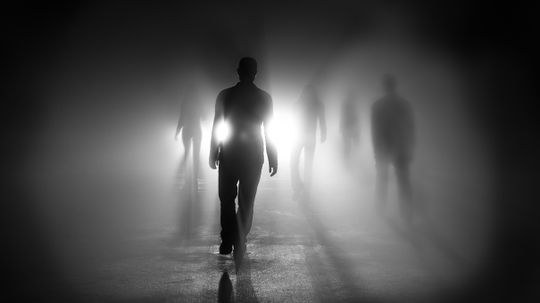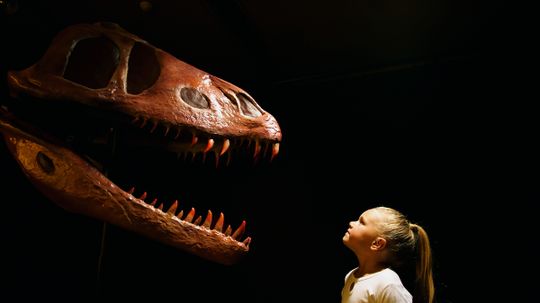Everyday Myths
There are certain aspects of everyday science that we think of as fact, but in reality may be pure urban legend. In this section, you can learn about some of the everyday science myths you may encounter.

Top 10 Ghost Tours

Top 10 Hotels That Will Scare the Daylights Out of You

What's So Scary About The Winchester House Story?

Spirit Guides Bring Believers Comfort, Insight, and Aid

Psychic Powers: Fun to Consider, Even Without Scientific Support

How to Manifest Love: Merging Mind and Heart

What Is a Group of Dragons Called? It's Almost Too Obvious

The Beast of Bray Road: Wisconsin's Claim to Cryptid Fame

Lougawou: A Haitian Vodou Werewolf

Do Marfa Lights Come From UFOs, Cars, the Military or Ghosts?

Solfeggio Frequencies: Healing Tones or Pseudoscience?

Is Sacred Geometry Related to Science or Is It Simply Beautiful?

What If Cows Didn't Exist?

What If Earth's Magnetic Field Flipped?

What If Humans Could Breathe Underwater?
Learn More / Page 5
A bunch of Yale physicists decided to give Schrodinger's cat not one but two boxes. And that, strangely enough, could eventually prove handy for quantum computing.
By Julia Layton
CERN's work has been groundbreaking to say the least, but conspiracy theories run rampant about the potential disasters it could cause, too.
By Diana Brown
From plane crashes and deaths to sports superstitions and hexagrams, many people believe that the number 23 possesses magical properties.
Advertisement
We've yet to find intelligent life outside of planet Earth. But instead of space, should we be looking right here but in other dimensions?
By Diana Brown
A surprising percentage of Americans believe that Big Pharma is hiding the cure for cancer because there's a lot of money to be made treating the disease. Experts explain why this isn't true.
By Dave Roos
You've heard this bit of hair care advice before, but is it true?
Whether you call it a contrast shower, a Scottish shower or a James Bond shower, it's guaranteed to wake you up. Here's why people are trying it.
Advertisement
Whether in "King Kong," "Journey to the Center of the Earth" or "The Lost World," humankind has long held out hope of discovering a secret land filled with prehistoric beasts. But is that even possible? Are dinosaurs still alive?
Picture the smells of a warm, sunny day in July. To your left, a neighbor is barbecuing. To your right, someone has put a warm apple pie on the windowsill to cool down. Smells great, right? So how does sunshine factor into all of this?
From tropical islands to arctic tundra, we humans appear capable of living just about anywhere. But do different groups of people fare better in certain types of climates, or are we just really good at adapting to the environment around us?
For decades, moms have been threatening that if you don't eat your crust, your hair will fall out, fall limp or somehow fall incorrectly. What's the deal with bread crusts and hairstyles?
Advertisement
If you've ever been to a slumber party, you know the drill. Place your fingers under someone's body, chant "Light as a feather ... stiff as a board ..."and they'll magically rise up into the air. Is this old trick a true ghostly phenomenon?
By Debra Ronca
Walking down a city sidewalk, you protect your valuables and weave through crowds. Should you also beware of falling pennies?
Chicago has long been known as "The Windy City." It's a pretty cool nickname, but does it live up to it?
Rainy, dreary, Seattle, right? Everyone says it's the rainiest city in the United States. However, Seattleites are keeping a secret from you. Find out if their rainy reputation is real - or if the rumor's all wet.
Advertisement
Summertime fashion - light in weight and light in color. Are these pastel colors a designer's choice? Or do light colors actually keep you cooler, as some say? Read to find out if you should ditch the goth wardrobe this summer.
Of all the cosmetic problems to worry about waking up to - dark under-eye circles, a blemish on your nose, new stubble on your chin - a headful of white hair ranks pretty low on your list. Should you be more concerned?
Of course you wash your hands after you use the restroom or work the room at a networking event. But what about after you play beer pong? Or cuddle a duckling?
Some say the real reason "no tear" shampoo works is that it has Novocain in it, desensitizing babies to its sting. Fact or urban legend?
Advertisement
It may shock you, but there's never been a widespread study conducted on the sanitation or the necessity of the courtesy flush. Can this practice inflict grievous bodily harm on your hindquarters - and the environment? HowStuffWorks weighs in.
If you think chainsaws were first invented to take down a swath of trees, think again. The real story is much more cringe-worthy and involves cutting bones during childbirth.




















